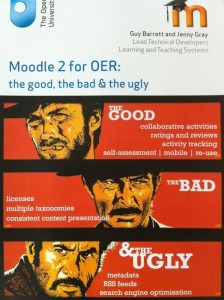Towards the end of last week the JISC / HEA OER Rapid Innovation projects and CETIS got together for an online catch up session facilitated by Programme Manager Amber Thomas. It’s a really interesting bunch of projects and it was great to hear how everyone is getting on.
Although it’s a bit early to start identifying specific technology trends across the programme, a few themes are already starting to emerge.
Unsurprisingly several projects mentioned that they were interested in using HTML5. Martin Hawksey who has been doing PROD calls with the OER RI projects to discuss and record their technical choices, noted that four out of eight projects already interviewed listed HTML5 among the technologies they plan to use; Bebop, Developing Linked Data Infrastructures for OER, SPINDLE, and Xenith. Synote Mobile also intend to use HTML5. It’ll be interesting to see if these intentions translate into implementation or whether any of these project go on to use alternative technologies.
Another broad theme that emerged was accessibility and widening access to open educational resources. Improving Accessibility to Mathematical Teaching resources is focused on making mathematics OERs fully accessible to visually impaired students, while two projects are aiming to make audio resources more accessible to a range of users. SPINDLE aims to increase OER discoverability by using linguistic analysis to generate keywords for enriching metadata, and the project also plans to investigate semi-automated generation of full-text transcripts. While Synote Mobile will make accessible, searchable, annotated recordings available on mobile devices.
There is also some interest across the programme in the Learning Registry development and the use of paradata. The SPAWS project plans to share paradata or usage data, such as reviews, ratings, and download stats, between widget stores and are currently developing recipes for paradata verbs which they hope to contribute to the Learning Registry Paradata Cookbook. And RIDLR will test the release and harvest of contextually rich paradata via the JLeRN Experiment to the Learning Registry.
I don’t know if this really counts as a theme, but it was also interesting to note that although the Rapid Innovation programme is very much focused on short term technical development, several of the projects discussed “soft” issues relating to the use of open technology. For example the aim of the Bebop project is to develop a WordPress plugin that can be used with BuddyPress to extend an individual’s profile to re-present resources that are held on other websites such as Slideshare, Jorum, etc. However Bebop’s Joss Winn added that by focusing on individual staff profiles they hope to encourage teachers to engage with using WordPress.
It’ll be interesting to see how these themes develop as the programme progresses and which other trends will emerge.
The recording of the OER RI catch up can be found here and Martin Hawksey’s aggregation of OER RI project feeds is here.
Oh and one last thing, great to hear that projects found the technical calls with Martin to be very useful, if you haven’t made a date to talk to him yet, drop him a mail now!
